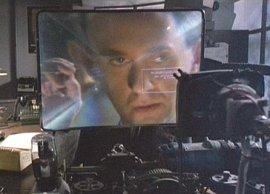YouTube and Human Rights
 Ok, ok, I know what you are thinking - YouTube and human rights, that's like an oxymoron, right?! How can a site as frivilous and silly as YouTube (cats pooping in toilets, booty bedroom shaking, stupid human tricks, etc.) have anything to do with human rights? Well, according to Mary Jordan's article in The Washington Post, there is a new site being modeled after YouTube to champion human rights:
Ok, ok, I know what you are thinking - YouTube and human rights, that's like an oxymoron, right?! How can a site as frivilous and silly as YouTube (cats pooping in toilets, booty bedroom shaking, stupid human tricks, etc.) have anything to do with human rights? Well, according to Mary Jordan's article in The Washington Post, there is a new site being modeled after YouTube to champion human rights: "Images have more resonance," said Gillian Caldwell, executive director of Witness, a New York-based human rights group whose credo is "See it. Film It. Change it." Her group has already gathered almost 3,000 hours of footage of human rights abuses from people in more than 75 countries. It is getting ready to launch a YouTube-like Web site for human rights. Caldwell said rights groups are increasingly harnessing the "power of images and human stories to motivate change." - Mary Jordan, Washington Post
"Images have more resonance," said Gillian Caldwell, executive director of Witness, a New York-based human rights group whose credo is "See it. Film It. Change it." Her group has already gathered almost 3,000 hours of footage of human rights abuses from people in more than 75 countries. It is getting ready to launch a YouTube-like Web site for human rights. Caldwell said rights groups are increasingly harnessing the "power of images and human stories to motivate change." - Mary Jordan, Washington Post
Wow, I guess YouTube does have the potential for massive social change, if wielded properly. To play my part in this inescapable digital media age, I finally gave in and bought a camera phone that also shoots video. So when that unexpected moment comes and Champ is lifting his algae-covered head from Lake Champlain, I will be ready to take some exclusive video from my kayak which I will then sell to WCAX for one million dollars. Oh wait, what were we talking about? Human rights, not hidden monsters of the deep. Right... The digital revolution is helping to throw light into some of the world's darkest corners. The photos of naked and shackled Iraqi detainees at Abu Ghraib prison -- images taken on soldiers' personal digital cameras and made public in 2004 -- focused a global spotlight on abuses there. Ordinary people going about their daily lives are now the first to document historic events.
The digital revolution is helping to throw light into some of the world's darkest corners. The photos of naked and shackled Iraqi detainees at Abu Ghraib prison -- images taken on soldiers' personal digital cameras and made public in 2004 -- focused a global spotlight on abuses there. Ordinary people going about their daily lives are now the first to document historic events.
Vacationers with cellphones and cameras recorded the first images of the December 2004 Asian tsunami. London commuters provided cellphone photos that Scotland Yard used to investigate the July 2005 bombings on the transit system. Cellphone images were among the first glimpses of the recent coup in Thailand, and they were the only way anyone would have ever known what happened to Hemy in a Kuala Lumpur police lockup. It truly is amazing to think of the possibilities of an entire society carrying around digital cameras. What will be left to tell once everything is recorded? Will storytelling become the way of the future once we are overloaded with 24/7 image saturation and cannot stand another bit of exclusive footage? Will cameras be implanted in our retinas? Will we have to create "safe spaces" where no recording devices are allowed? Only time will tell, but for now, it looks like YouTube is spawning some ventures which will give the powerless a forum to be heard and seen.
It truly is amazing to think of the possibilities of an entire society carrying around digital cameras. What will be left to tell once everything is recorded? Will storytelling become the way of the future once we are overloaded with 24/7 image saturation and cannot stand another bit of exclusive footage? Will cameras be implanted in our retinas? Will we have to create "safe spaces" where no recording devices are allowed? Only time will tell, but for now, it looks like YouTube is spawning some ventures which will give the powerless a forum to be heard and seen.











18 comments:
"Only time will tell, but for now, it looks like YouTube is spawning some ventures which will give the powerless a forum to be heard and seen."
Oh come on now. Crediting YouTube for this ignores the whole World Wide Web itself, which has already given the powerless a forum to be heard and seen. (Or at least the powerless that can afford digital cameras, video cameras, computers, broadband Internet connections, etc.)
Last week, bloggers were saving the world. Before that, it was Geocities. Before that, it was the browser.
Giving YouTube credit is is just hype. Every single startup is trying to compare itself to YouTube because it wants to secure venture funding capital. You go in to your meeting and say, "We're creating a social networking site with rich media. It's like YouTube meets MySpace, only for human rights/music videos/cat and dog owners/CosPlay aficionados," whatever.
One downside to digitizing everything is the ability to easily manipulate everything. We may be recording history, but we're doing it in a way that can easily be manipulated. Digital photos get imported to Photoshop and immediately altered; there's no "negative" to prove the original is legit.
The downside to all of this, as you note, is that we may need video-free zones. We're also giving away a lot of our privacy. We're probably less concerned about being taped in public; why not just mount cameras to every street light and broadcast them 24/7 online? It'll be fun, and not at all creepy and police state-like.
And just to be even more of a buzzkill, consider this: Google owns YouTube. Google chose to censor its search results so it could open a Chinese office.
So, if YouTube is a model for the new frontier in exposing human rights violations, it's probably ironic that its owner puts its own profits ahead of helping the Chinese people expose the human rights issues with their government.
The google china argument has a couple sides though, one is that google are a bunch of money grubbing dicks, the other is that they got their foot in the door by bowing to government pressure and offering some if not all the capabilities of regular google search. But it is still more than china had previously, and allows for the possibility of future expansion of rights...
Whether i believe this arguement or not, i don't know... but i havn't written google off yet, gmail rocks.
and by expansion of rights, i somehow meant expansion of search results...
rights too i guess.
and on the topic of easily manipulating everything, i'd have to say "yipee!" how much fun post modernism can be, this digital age has brought art to the masses, (and alot of shit too... but that's a matter of personal taste.)
history has never been accurate and has changed with every new generation. The more ingrained in us and obvious it is that nothing is inherently true (or false) - the less we'll take for granted, and the smarter we'll be.
IMO and i've had a few beers.
well, imho:
1. "the award goes to..." - i don't care who gets the credit, i think when something cool comes of the internet, digital video, youtube, bloggers or what have you, i applaud that. damn straight, you got something right there, good on ya!
and in that vein, i have a show to pitch for you: "It's like YouTube meets MySpace, only for metalhead bikers/documentarians/lovers of goldfish/World of Warcraft aficionados."
2. google in china - again, the more info the better. if you gotta dilute the water to get a tall cool drink into a country, then so be it. the water can get clarified later and I'd rather have cloudy than nothing at all.
3. digital manipulation - what is real anymore? what is fake? the lines are blurred beyond recognition so i say blur it to the hilt. take it into 5th gear, see what the hell happens, see if she holds together.
4. being filmed 24/7 - is the future going to be Brazil, Blade Runner, Gattaca or 2001? will it be a hyper vigilant, creepy as hell, constantly surveillance camera covered police state? or will it be a ratty ass, hobo heaven with technology mixed into the festering mess? what was i babbling about? oh right, i want one of those cool cars in Blade Runner that flies!
i do agree w/ you steve about the whole hype about youtube being this new bastion of social awareness... you're right, internet has been bringing us the terrible truths for years...
and before that... tv, then the newpapers, and then word of mouth... you know what? We've known to some degree just how much terrible shit has being going on all around us...
I don't think it's knowing it's out there that's as important as dissolving our apathy regarding it.
Do you know how many domestic abuse videos, how many beheading videos, and how many monkey's fall out of tree after smelling own poo videos i've seen, and felt completely powerless to do anything about?
just because we can watch it on youtube, or read about it on someones blog, doesn't unnecessarily make anything better.
yes, apathy is a problem and always has been. but Mary Jordan's Washington Post article was referring to a specific incident in Malaysia in which cell phone footage from a human rights violation DID bring some results, despite viewer helplessness.
Granted, they are mixed results for Hemy Hamisa Abu Hassan Saari, the woman who was detained falsely for drug possession, stripped and forced to do squats. The cell phone footage that a guard took of this incident has circulated all over the web and even made it to TV. it caused Hemy much pain and embarrassment BUT it may win her a big cash settlement AND it may change the Malaysian prison practice of forcing people to do naked squats.
so i say the verdict is still out as to where all this video exposure will lead us exactly, but in Hemy's case, there were some positive (and sucky) results. lots of people saw this video, they were shocked, the Malaysian government looked bad and something changed for the better for all the future Malaysian prison detainees. not bad at all for a little cell phone.
It's hard to draw too much societal importance from one or two anecdotal examples. We're not seeing waves of YouTubers out protesting incidents in Malaysia; it's mostly kids, and they're seeking out any "extreme" content because they have no real concept of pain or humanity. They probably laugh.
And there's nothing to say that video being sent to CNN wouldn't have the same affect. In fact, with so many 24/7 news networks, it's rare when a story isn't covered, particularly if it's on video.
I'm not sure I agree that censoring results to appease a fascist government is a positive step; if anything, it's just appeasement. If you search for Tibet from Chinese Google, you'll hear nothing about how your government has massacred thousands of people. How is that better for people?
Or how about when Yahoo gave China the private information of a person who had spoken out via Yahoo boards against China? These are the costs of doing business there, and we're supposed to feel okay about it because it might cause positive change?
Or is it just because it's Google, a company everyone loves (and it must be said, is the only reason the web is actually useful), that we don't think it's that bad? Or to put it another way, would we feel okay if it was just Microsoft and Yahoo?
As for digital equipment bringing art to the masses, hmm. You mean the digital equipment that costs thousands of dollars? I'm not sure it's bringing anything to the masses; it's bringing it to the middle class and higher, though. Um, yay?
History is made up of facts; the interpretation of history, however, is where the discrepancies come up. Being able to actively manipulate history--either digitally or via book burning, etc. like Nazis and other fascists did--is a frightening prospect. The sites that constantly archive the web help by taking snapshots of the web at various points, but what you can do with digital photography, yow. Did you hear about the AP or Reuters photographer who "embellished" photos of Lebanon during the Israeli incursion there to add more smoke and damage, making it look worse than it really was?
Well at least china has Wikipedia to go to now -
History is not facts, history is interpretation of facts, perhaps there was some absolute moment of truth but those end as soon as they occur - history will always be interpreted differently by different people, we may find general consensus, but it'd be folly to believe that as absolute truth. What I'd be more concerned w/ is the lessons we're learning from our perceived history and how it's being used to create our world today.
And w/ the Lebanon photographs, i think it's sad that he had to embellish the photographs, but i think it's also sad that as a people we have to have MORE SMOKE! MORE BLOOD, MORE FIRE! in order to be shocked by civilians being bombed. I've seen both the original and doctored photo, and they're both bad news. people still died, homes were destroyed, human rights were violated - those are the real truths of those pictures, doctored or not.
I am not championing YouTube as the next great thing in the fight for human rights - but i am not gonna knock it if it does play a small part in making things better.
Humans have always enjoyed the sick spectacle of people hurting people (call it the "Jackass Effect" if you will). It must be encoded in our dna. First we had the Roman Colosseum and now we have YouTube.
Still, I am not gonna turn my nose up at the few good things that DO come out of this modern society of video sharing of cell phone footage. Even if only a few random people are helped, I am sure it makes a difference to the next Malaysian prisoner who does not have to do naked squats anymore thanks to this exposure...a BIG difference.
I have mixed feelings about this TMI media saturation. On the one hand, it seems overblown, grotesque and creepy. On the other, it seems like it may unearth a hidden truth here or there.
In the future, I am guessing we will all have "skintennas" that feed a constant stream of images and information into our brains. We can think a thought to our best friend - someone somewhere may even be transcribing these thoughts if they care to. Maybe we will have to build special media-less rooms and homes to block out all these thoughts, images and airwaves that will be floating willy nilly. Maybe concepts like privacy and intimacy will be meaningless in the future?
As for Google and Yahoo in China. Again, it may not be the ideal sitation but I do think it is better than nothing. The internet is such an uncontrollable squidgey mess that as best as they try to limit search functions, there are ways for anti-government info to be found. It is impossible to control the web, no matter how much you try to restrict it, it will seep out of your computer and take on a life of its own, that is its beauty in my humble opinion. It is like that guy from the future in T2, it is made of liquid metal and you cannot destroy it, even if you are Arnold Schwarzenegger.
Digital equipment is far more affordable than it has ever been. For proof, check out all the different types of people doing vlogs on YouTube. It is not restricted to the middle and upper classes AT ALL. everyone seems able to afford a computer and a web cam. And the democratizing force of this is really cool.
Personally, that is why I dig YouTube. I get to hear stories from a wide swath of people. I don't have to watch the rich asses like Paris and Diddy who already oversaturate my TV, I can give my ear to the host of nobodies that YouTube makes available.
As for history being rewritten by digital manipulation. I agree that retouching the photos of Lebanon is awful and I am glad the fakery was exposed. Still, I do not think this is a new thing. As long as we have been recounting history, we have been embellishing it and exagerrating it. What we know of our past is affected by the people who chose to tell it to us.
Being of a slightly postmodern bent, I think all history is diluted and altered. This doesn't bother me that much, it is a given. The thing about the internet is, it makes many, many, many different versions of history (and the present) available to us. We have more information than we know what to do with and we are cynical enough to question all of it.
The internet is like Pandora's mythic box (ooh, I think I have my next blog post!), but the evils of mankind existed long before we opened the box and will continue long afterward. All we can do now is sift through the contents and try to use them for good.
"History is not facts, history is interpretation of facts."
Hmm, history is absolutely facts. The interpretation is an entirely different thing.
Bill Clinton was elected president in 1992 and 1996 is a factual statement. Interpreting his impact on the economy is something entirely different.
In a totally digitized world without significant oversight and constant snapshots, Bill Clinton may not have been elected president in 1992. The Wikipedia is the best and worst example of constantly rewriting the actual facts of history; one major web thinker, Jaron Lanier, wrote of how he's a filmmaker according to his entry. But he's not. And he keeps removing it, but it keeps going back.
The photographer in Lebanon may have been trying to make his point stronger, or maybe he was just trying to drive up the price of his photo.
"Still, I am not gonna turn my nose up at the few good things that DO come out of this modern society of video sharing of cell phone footage."
I'm just wondering if people are thinking through the consequences. Saving one person is amazing; what about the people whose lives are ruined just because their boyfriend or girlfriend decides to post their private fuck film online? Or the people posting hidden cameras in bathrooms or locker rooms, and selling the video footage. We need to protect the privacy of individuals from both other individuals and, more ominously, our government. I still contend that the more we accept cameras in our lives, the more likely we'll accept the government spying on us.
"Again, it may not be the ideal sitation but I do think it is better than nothing."
Ah, but revolutions are not born from appeasement. To use the unfortunate Goodwin's law, the Holocaust didn't occur because every German was a Nazi. It happened because so few people were upset about it.
Before Google conceded, Chinese people would access it illegally; today, since most people can access it normally, I wonder if people are as likely to seek out the actual truth, or will take the lazy way out and accept the truth as delivered by their government. Apparently, the "great firewall of China" is getting better and better at keeping Chinese people from accessing anything critical of the Chinese government.
"As long as we have been recounting history, we have been embellishing it and exagerrating it. What we know of our past is affected by the people who chose to tell it to us."
Sure, the interpretations will always be open for discussion. But I'm talking about the actual facts being manipulated.
For example, the White House excised a bunch of language from actual speeches by George W. Bush at the official White House website, which is the ultimate kind of revisionist history. It wasn't the interpretation that was changing; it was the actual facts.
Fortunately, others had copies, and there were snapshots that showed the alterations. But there's no guarantee that history couldn't have been permanently altered, and I find that incredibly disturbing.
Anyway, I agree that digital equipment is more affordable than ever, but I still think we're seeing it used almost exclusively by the middle- and upper-class. It's not truly democratic technology because it's still not available to everyone. A $300-$400 computer with a webcam still requires a broadband Internet connection in order to view video. Even that may be out of reach for some people.
Well steve, i see what you're saying - and to some degree i agree w/ you, i feel like some of your argument ends up being a seeing the trees for the forest; i agree bill clinton was president from such and such a date, and yes jesus christ perhaps was a man who lived somewhere around this and that, but those aren't what make either of those people important, it's their supposed actions, and those actions and truths are completely changable. Given enough time, their existence itself comes into question.
I also agree that this idea of changable truth is potentially dangerous, the holocaust being a great example - but i feel that as equally dangerous is the idea of absolute truth, and it's use by religious governmental, and just plain idealogical leaders throughout history.
Hitler, being another great example of the dangers of percieved truth taken to extremes.
I suppose that for their to be any progress, or more so, progress in a direction that benifits the most people possible, we have to agree on something, but i feel like we'd be better off if that agreement was based on a foundation of relativity, not absolutism.
"i agree bill clinton was president from such and such a date, and yes jesus christ perhaps was a man who lived somewhere around this and that, but those aren't what make either of those people important, it's their supposed actions, and those actions and truths are completely changable.
The actions of people are absolute statements of fact; again, it's the interpretation of the results of said acts or the motivations that are questionable. Bill Clinton signed a law on August 20, 1994 is a fact. How it affected society is open to interpretation.
It's getting close to Stephen Colbert's truthiness. But just believing something isn't factually accurate doesn't make it so, even when parroted by Republicans.
"Given enough time, their existence itself comes into question."
The only way someone's existence comes into question is in an era where facts are easily malleable. There's no way to know with absolute certainty if Jesus existed, but we do know that you exist. And with science, we can prove you scratched someone, or sweat on something. (Er, if we needed to prove this.) DNA is pretty good proof of existence.
Digitization does create some scenarios where I could eliminate you from existence, at least from a bureaucratic perspective. But there are still plenty of other factual examples of your existence: Photos, videos, your DNA, etc.
"but i feel that as equally dangerous is the idea of absolute truth, and it's use by religious governmental, and just plain idealogical leaders throughout history."
Well, if you want to say that religion and facts have no business being mentioned together, you'd get no argument from me. But I still have a hard time dismissing absolute truths outright because I believe in science.
"but i feel like we'd be better off if that agreement was based on a foundation of relativity, not absolutism."
Relativism has all sorts of problems. If we say, "No one is right or wrong; it's all relative," then you can pretty much justify anything. Or nothing.
It's kind of a dead-end.
"i feel like we'd be better off if that agreement was based on a foundation of relativity, not absolutism"
Also, isn't coming to this agreement an absolute?
I wouldn't say this agreement is absolute, there's no definitive end... see, i just continued the conversation, i never once believed that this conversation was closed, although we may not have talked for a few days.
I believe in science, just like you do. But science will never lay claim to absolutes, there is no way to prove something definitively in science, though as w/ dna testing, there is enough definition in our world to say, finger a murder, or find out someone's real parent. And this is all well and good.
These are however, still changing sciences, if we were just say simply "DNA testing has reached the pinacle of perfection, we no longer need to do research in this field" than we may very well miss out on the chance to further refine our methods, perhaps we'd even regress into laziness...
I'm not suggesting we should ignore the progress we've made, but i do feel it's important to always be revaluating "fact" if only because 99% of what we concider fact is nothing more than suposition hardened by lazyness.
The other 1%, well, that may be fact, but i'd still say it's up in the air.
steve,
i think you make a lot of good points and i'll try to address a few of 'em here.
i agree that it is a wee bit disturbing HOW much digital footage is out there and how in many cases, the people being featured were unaware of their participation.
for instance, one of the top viewed youtube vids yesterday was two girls on a beach in bikinis blowing up an inflatable air mattress. why so many hits? the video was called something like, "Hot Girls Give Blow Job on Beach."
When looking at YouTube today, I can no longer find this video. i am guessing it was removed BECAUSE it is more than likely that the girls in the video did not know they were being filmed and did not know that they (or their butts at least) were going to be a YouTube sensation.
this is pretty creepy. as creepy as those dudes who scour malls for young girls wearing mini skirts so they can film their underwear with hidden cameras.
my question is this, how do we fix this? what is the solution? who polices this? how to control it? since human decency does not seem to act as a stopgap, what or who can?
and it all gets even murkier when you throw in the whole Girls Gone Wild phenom and the fact that young girls are emulating porn stars, dreaming of being Playboy bunnies AND posting sexy dancing vids to YouTube for attention. thus, the argument of the sleazy dudes shooting the hidden video is invariably, "well, why do they dress so sexy if they don't want me to pay attention to them?" sticky business and no real concrete answers in sight...
as for google in China. To be honest, I do not know many of the facts about this issue so I should probably research more before shooting off my mouth (never stopped me before ;). still, i can't help but get the impression that a little dose of google can go a long way. especially when the masses are not going to have the know how to find the real google illegally (which would leave them with no info which is worse than restricted info).
the internet is so mushy and complicated - it seems impossible to restrict all access to truth and honesty in such a malleable, ever shifting environment. like trying to force a thundering waterfall into a thin pipe - there is bound to be run off.
yes, i agree that the changing of facts is a bad idea. but again, i do not think this is a new thing. maybe we are craftier at changing facts and covering our tracks BUT we have always tried to do it. again, i think it comes down to this. human beings are flawed crafty, sleazy buggers. this has always been so and will not change anytime soon.
if we can shoot pervy video of a hot teen without her approval and make money off it, we will. if we can change history so we look better, we will - presidential parties and sleazeballs alike.
on the flip side, humans are also pretty good, honest creatures and we will try to hold people to account when they film people unawares and mess with the facts. so hopefully these ying yang sides of our personalities will continue to push and pull and do evil and do good and struggle this way and that - for the rest of our meager existence on this planet.
moving on to digital equipment for the masses. honestly, i think it is amazing how accessible this stuff is. in youtube land alone, check out Zen Archer, Boh3m3, rickyste, morbeck and filthywhore. most of them still live with their parents and they are making pretty popular vids. in youtube land, money gets you some attention (paris and diddy) but "realness" gets you even more (and as with everywhere else, TNA helps too).
when i was younger, you had to have a ton of money to shoot video or film and now it is something just about anyone can do. i meet 9 yr olds who tell me they are making their 10th movie!? egads! high schools have computers and digital equipment that everyone can learn how to use. this is standard and accessible.
digital advancements like this make me glad. i think the more people telling their stories, the better (but who will be left to hear these stories?). and i would prefer this to a bunch of creepy exploitational vids shot up girls skirts (titillating though those may be!).
anyways, good hot topics. interesting to see what will happen next in the ever fluxuating digital universe!
Post a Comment